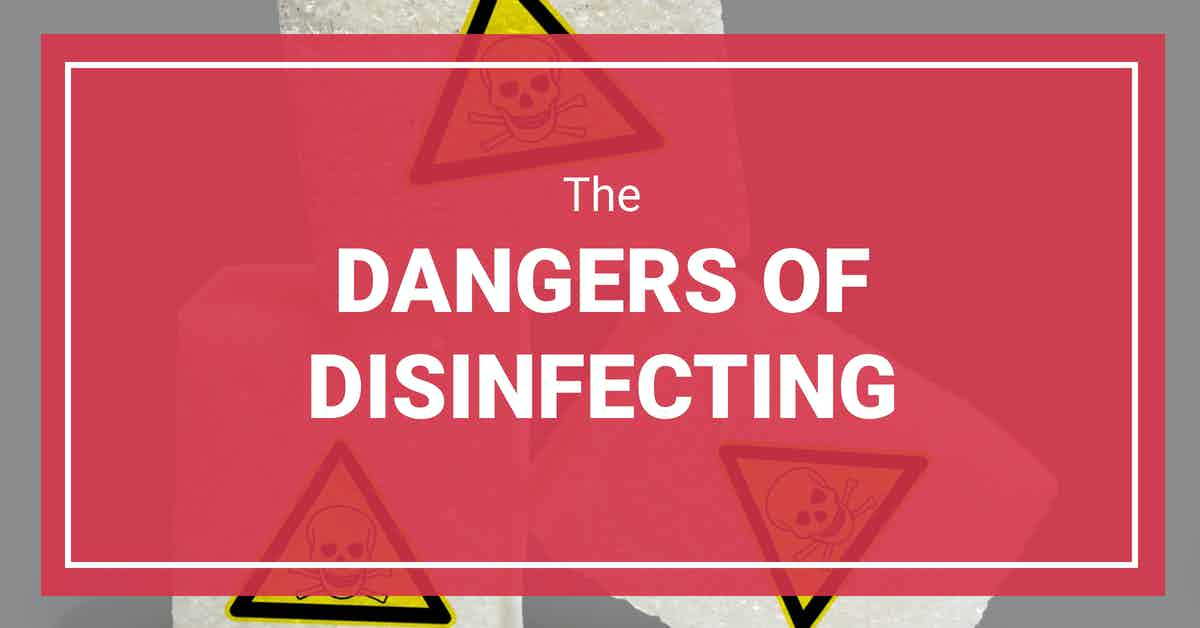The concern regarding surface safety and hygiene during the COVID-19 pandemic has led many individuals to over or unsafely apply dangerous disinfectant chemicals in a manner that is not only ineffective at combatting the pathogen but may pose a higher risk to individual health.

The Dangers of Over Applying Disinfectants
Several disinfectants have been labeled as effective by the U.S. Environmental Protection Agency (EPA) in the fight against SARS-CoV-2--many of which can be deadly if used incorrectly.
According to a recent article posted by Insurance Journal;
Cleaning companies are selecting disinfectants from hundreds on List N, the month-old compendium of products approved by the Environmental Protection Agency to kill the novel coronavirus.
Those chemicals have passed tests to show they’re effective against the pathogen, but “this doesn’t mean that they have been approved because they’re considered safe with regard to human health.
Limited studies, including on rodents, have raised concerns that some might increase risk of neurological and dermatological problems, as well as respiratory ailments like asthma, or have notable reproductive effects.
And while those studies don’t necessarily mean the disinfectants are harmful to humans, environmental health experts contend that risks are rising sharply with the increase in exposure.
They also note that there are alternative ways to kill off the virus that carry less potential risk.Health Experts Caution Over Disinfectants, Cleaning Methods Used in Rush to Reopen
Unfortunately, fear and uncertainty surrounding the spread of COVID-19 have led many to needlessly overapply disinfectant products containing chemicals, largely untested for negative human health issues, on pretty much every surface in the hopes of killing the virus and staying healthy.
A few points that are commonly overlooked:
- Increased rates of full facility disinfection are not necessary--COVID-19 is an enveloped virus that is highly susceptible to deactivation with regular household soap and water.
- You have to clean a surface with soap and water first before applying a disinfectant, or the disinfectant isn't effective.
- The only increase in disinfection application rates should be on high-contact touchpoints.
- Large amounts of concentrated commercial disinfectants are not necessary--COVID-19 can be killed with watered down household bleach, and;
- Safer disinfectant products, such as 70% rubbing alcohol, have been approved for use in combatting COVID-19 by the U.S. Centers for Disease Control and Prevention (CDC).
How Dangerous Are These Products?
To get an idea of how dangerous some of these disinfectant products are, let's take a look at some of the known side-effects of the active ingredients in the first five products listed on the EPA's List N.
Sodium Chloride
- Increase heart rate
- Fever
- Hives, itching, or rash
- Irritation
- Joint pain, stiffness, or swelling
- Redness of the skin
- Shortness of breath
- Swelling of the eyelids, face, lips, hands, or feet
- Tightness in the chest
- Trouble breathing or swallowing
Source:
Quaternary Ammonium
Products containing Quat's as the active ingredient are highly effective at killing pathogens quickly.
However, Quaternary Ammonium Compounds get an F from the Environmental Working Group (EWG), due to its links to:
- Skin allergies and irritation, and;
Source:
Sodium Hypochlorite
Even the classic standard for disinfection in homes and small offices--bleach--comes under fire when incorrectly or over applied, with symptoms ranging from:
- Rash
- Hives
- Itching
- Red, swollen, blistered, or peeling skin with or without fever
- Wheezing
- Tightness in the chest or throat
- Trouble breathing, swallowing, or talking
- Unusual hoarseness; or swelling of the mouth, face, lips, tongue, or throat
Source:
Peracetic Acid
Peracetic acid is a common chemical found in commercial disinfectants throughout multiple industries, including healthcare and food service, and carries a surprising number of potential side effects.
According to The Synergist;
[T]he substance is corrosive to the eyes, the skin, and the respiratory tract.
Symptoms of acute exposure may include cough, labored breathing, and shortness of breath; skin redness, pain, and blisters; and “severe deep burns” in the eyes.
[... major concerns were actually the fire and explosion hazards and reactivity issues.
[P]eracetic acid reacts violently with soft metals such as brass, copper, iron, and zinc.
And at concentrations of 15 percent or higher, a major chemical manufacturer, FMC Corporation, recommends explosion-proof equipment.
References & Resources
Takeaway
Chemical disinfectant products are valuable tools in the ongoing fight against COVID-19 and other deadly pathogens that plague the health and wellbeing of our population every day.
However, they are dangerous when over-applied or used incorrectly, especially in the absence of safety equipment, adequate ventilation, and product safety training.
During this crisis, one thing we must not do is create new, worse problems for ourselves, our environment, and our children in an attempt to quickly overcome this challenge.
Outsourcing your facility's enhanced cleaning and infection prevention and control measures is a proven method for adhering to the highest standards of safety and cleanliness without cutting corners or endangering facility occupants.
If you would like more information regarding the effectiveness of high-performance infection prevention and control measures, or if you would like to schedule a free, no-obligation onsite assessment of your facility's custodial needs, contact us today for a free quote!
In Bakersfield CA, call (661) 437-3253
In Fresno CA, call (559) 206-1059
In Valencia CA, or Santa Clarita CA, call (661) 437-3253
In Palmdale CA, or Lancaster CA, call (661) 371-4756

